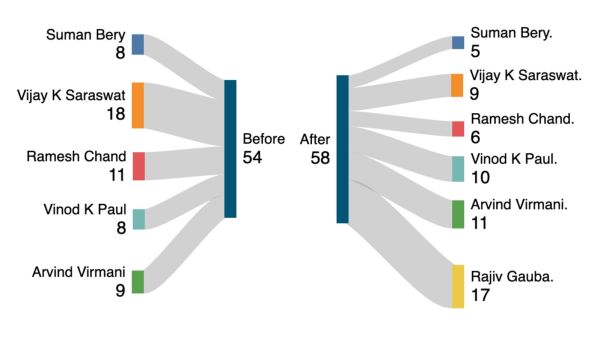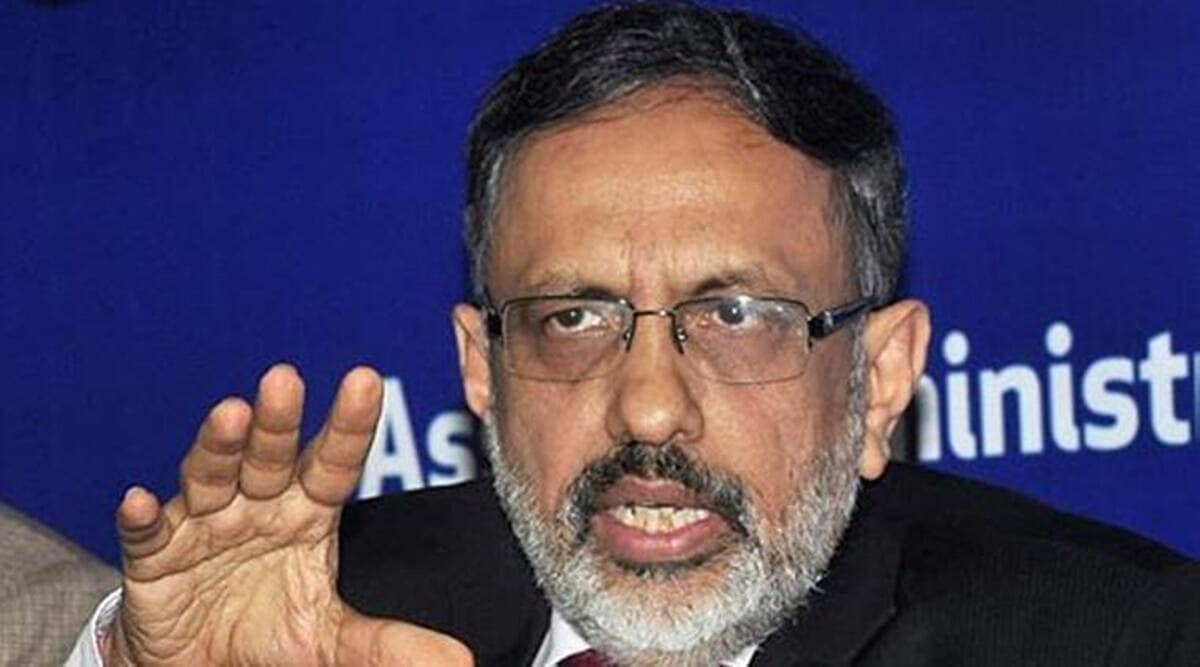Marking a major shift in power within NITI Aayog, key security, infrastructure, and energy ministries have been moved under former Cabinet Secretary Rajiv Gauba, who was appointed full-time Member on March 25, documents accessed by The Indian Express show.
Gauba — once the most powerful IAS officer in the country — now oversees 17 ministries and departments, the highest among his colleagues at India’s apex public policy think tank chaired by Prime Minister Narendra Modi. He is followed by Arvind Virmani (11), VK Paul (10), VK Saraswat (9), Ramesh Chand (6), and Vice Chairperson Suman Bery (5). NITI Aayog Members play an important role in assisting the Centre design policies and schemes.
 As per the April 4 order, NITI programme directors (PD) must first route Cabinet Notes to the concerned Member for inputs, then to the CEO, who forwards them to the Vice Chairperson for final approval.
As per the April 4 order, NITI programme directors (PD) must first route Cabinet Notes to the concerned Member for inputs, then to the CEO, who forwards them to the Vice Chairperson for final approval.
Prior to the reshuffle on April 4, Bery held a total of eight portfolios — Prime Minister’s Office (PMO), Cabinet Affairs, Ministry of Home Affairs (MHA), Ministry of Personnel, Public Grievances and Pensions, Ministry of Development of North Eastern Region (MDoNER), Ministry of Information and Broadcasting (MIB), Ministry of Tourism, and Ministry of Culture.
Now, Bery holds five portfolios, with MHA and personnel ministry transferred to Gauba, who has earlier served as Union Home Secretary between 2017 and 2019. The Cabinet Affairs portfolio was removed altogether, and MDoNER transferred to Saraswat. Bery, who signed off on the new allocations, also got the Department of Economic Affairs under the Ministry of Finance.
Gauba, who has been India’s longest serving Cabinet Secretary — for five years between August 2019 and 2024, the entirety of PM Modi’s second term — received a total of nine allocations previously under Saraswat, the oldest NITI Aayog Member since 2015. These include ministries of defence, coal, power, new and renewable energy, petroleum and natural gas, railways, civil aviation, road transport and highways, and ports, shipping and waterways.
The NITI Aayog did not respond to requests for comment.
In addition to MDoNER transferred from Bery, Saraswat, former head of Defence Research and Development Organisation (DRDO), retained ministries of earth sciences, science and technology, communications, electronics and information technology, mines, and heavy industries. He has also been given previously unallocated departments of atomic energy and space.
Story continues below this ad
From Virmani — NITI’s most recent Member before Gauba, appointed in 2022 — the ministries of external affairs and housing and urban affairs were reassigned to Gauba, who had earlier served as Union Housing Secretary.
Despite the transfer, Virmani’s portfolio expanded from nine to eleven, as he retained the Department of Commerce and the ministries of finance (excluding the Department of Economic Affairs), statistics and programme implementation, overseas Indian affairs, labour and employment, corporate affairs, and skill development and entrepreneurship.
Virmani also gained the Department for Promotion of Industry and Internal Trade (DPIIT) and the ministries of micro, small and medium enterprises (MSME), steel, and textiles — all previously under Saraswat. He earlier served as Chief Economic Advisor to the finance ministry (2007–2009) and after that as an Executive Director at the International Monetary Fund (IMF), representing India, Bangladesh, Sri Lanka and Bhutan.
Gauba was also transferred ministries of consumer affairs, food and public distribution, rural development, panchayati raj, and environment, forest and climate change from Chand, Member since 2015. Chand retained ministries of agriculture and farmers’ welfare and food processing industries, and departments of chemicals and fertilizers. He also received charge of previously unallocated ministries of cooperation and animal husbandry, dairying and fisheries.
Story continues below this ad
Chand, previously Chairperson of the Institute of Economic Growth and Member of the Fifteenth Finance Commission, also lost ministries of jal shakti and youth affairs and sports to Paul, who retained all of his earlier allocations. These include the Department of Pharmaceuticals and ministries of health and family welfare, ayush, women and child development, education, social justice and empowerment, minority affairs, and tribal affairs. Paul, a renowned public health expert and former faculty at AIIMS, New Delhi, was appointed NITI Member in 2017.
The Ministry of Law and Justice was also moved out of Chand’s portfolio. As per the April 4 order, NITI Aayog’s Law Vertical was reallocated to CEO BVR Subrahmanyam. The CEO retained authority over work relating to the State Support Mission and the Voluntary Action Cell, which deals with increasing engagement between civil society groups and the government.
In addition, Subrahmanyam was also entrusted with key flagship initiatives, like the Aspirational Districts Programme (ADP) and the Aspirational Blocks Programme (ABP), and work relating to the Governing Council Secretariat and Coordination. He was appointed CEO in February 2023.
As per the April 4 order, NITI programme directors (PD) must first route Cabinet Notes to the concerned Member for inputs, then to the CEO, who forwards them to the Vice Chairperson for final approval.
Story continues below this ad
The last major reshuffling of portfolios happened in December 2022, soon after Virmani joined NITI Aayog as Member.

